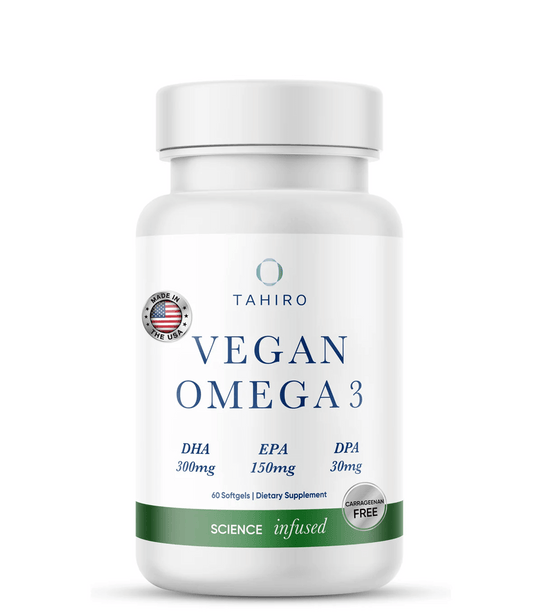Omega-3 fatty acids are essential nutrients with countless health benefits. These fats are known for their role in heart health, cognitive function, and inflammation reduction.
However, when it comes to supplementing your diet with omega-3s, the debate between fish oil and flaxseed oil is a hot topic among health-conscious people.
This article will explore the differences and benefits of fish oil and flaxseed oil and introduce the sustainable plant-based alternative: algae oil. The goal is to give you sufficient information to decide which one best suits your goals and needs.
Key takeaways
- Flaxseed oil is obtained from flaxseed, and while it contains omega-3 fatty acids it’s mostly made up of alpha linolenic acid (ALA).
- Fish oil is made from the fatty tissues of oily fish, and it contains the most effective forms of omega-3s: eicosapentaenoic acid (EPA) and docosahexaenoic acid (DHA).
- Algae oil is an omega-3 supplement since it’s a plant-based source of omega-3 fatty acids, containing EPA and DHA.
Tahiro’s omega-3 supplements are made from algae oil, superior to traditional fish oil, and offer an eco-friendly solution to get your daily dose of omega-3 fatty acids.
What Is Flaxseed Oil?
Flaxseed oil, derived from the seeds of the flax plant, is a rich source of alpha linolenic acid (ALA), a type of omega-3 fatty acid commonly found in plans. Its popularity arises due to its potential health benefits and its status as a vegan-friendly option for getting a daily dose of omega-3.
Benefits of Flaxseed Oil
-
Heart health. Research shows that ALA in flaxseed oil may help reduce the risk of heart disease by lowering cholesterol levels and blood pressure (1).
-
Anti-inflammatory. Flaxseed oil can help reduce inflammation by lowering oxidative stress. As a result, it may help the symptoms of inflammatory conditions, such as arthritis (
-
Skin health. Its omega-3 content also contributes to healthier skin by improving hydration and reducing redness and irritation (3).
What Is Fish Oil?
Fish oil is obtained from the tissues of oily fish, such as mackerel, salmon, and sardines. It’s rich in omega-3 fatty acids, especially in eicosapentaenoic acid (EPA) and docosahexaenoic acid (DHA). These are directly used by the body, making fish oil a highly efficient source of these nutrients.
Benefits of Fish Oil
Flaxseed Oil vs. Flaxseed Oil: Key Differences
The primary difference between flaxseed oil and fish lies in the type of omega-3 fatty acids they contain.
Flaxseed oil contains ALA, which the body must convert into EPA and DHA, a process that has been known to be inefficient. On the other hand, fish oil provides direct sources of EPA and DHA, making it more potent in delivering the benefits associated with omega-3s.
Flaxseed Oil vs. Flaxseed Oil: Which One is Better?
Choosing between fish oil and flaxseed oil depends on your dietary preferences, health goals, and specific needs. Fish oil is generally considered more effective for those looking for cognitive benefits or specific heart health support since it’s a direct source of EPA and DHA.
However, fish oil is unsuitable for people following a plant-based diet, it may contain heavy metals, and it’s not a sustainable source of omega-3s.
Flaxseed oil is a great source for those following a plant-based diet or those who are allergic to fish. Nonetheless, as mentioned, it contains ALA, which must be converted into EPA and DHA inefficiently.
Algae Omega-3: A Plant-Based Alternative
Algae oil emerges as an excellent alternative for those seeking the benefits of omega-3 without the drawbacks of fish oil and flaxseed oil. It is produced from microalgae, which is a direct source of EPA and DHA.
Benefits of Algae Oil
-
Sustainable source. Cultivating algae for omega-3 production is more sustainable and eco-friendly than fishing or flaming flax.
-
Mercury-free. Algae oil avoids the mercury and pollutant concerns associated with some fish oils.
-
Vegan-friendly. It’s a suitable source of omega-3s for vegans and vegetarians, providing the benefits of EPA and DHA without animal products.





